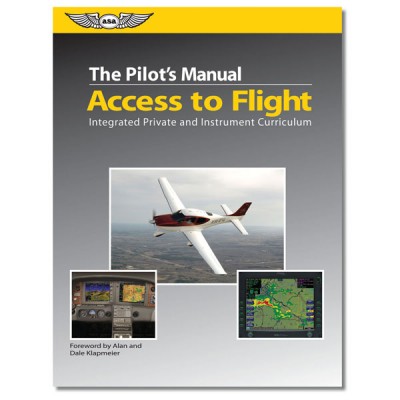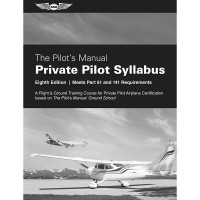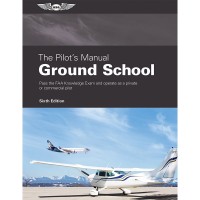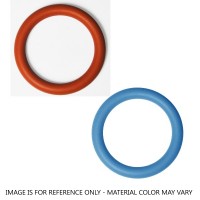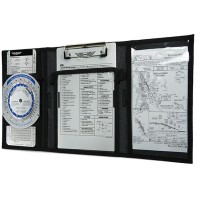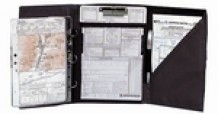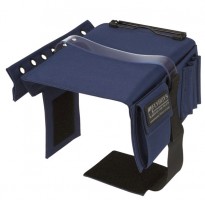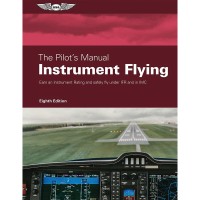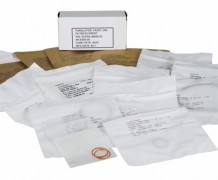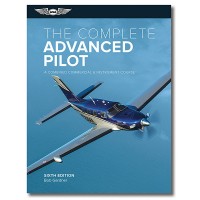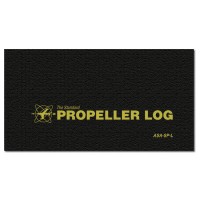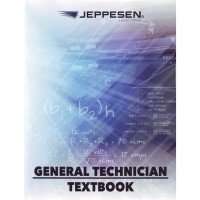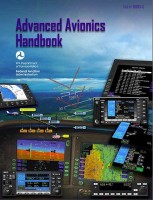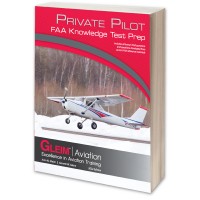Aircraft Spruce Canada
Brantford, ON Canada
Corona, CA | Peachtree City, GA
Chicago, IL | Wasilla, AK
ASA - The Pilot's Manual Access To Flight - Syllabus
MFR Model# ASA-PM-AF-S
Overview
|
Integrated Private and Instrument Curriculum. The most efficient way to train for your personal transportation solution!
Important FAA rule change released 8/31/2011 allows for a combined Private Pilot and Instrument Rating Course/Checkride. It's a revolutionary way to train! Whether you fly for pleasure, business, or a career in aviation, the Private Pilot certificate with the Instrument Rating is your ticket into the full spectrum of the airspace system—it is the key to maximizing the utility of a general aviation aircraft. This book provides the information you need to learn how to fly under both visual flight rules (VFR) and instrument flight rules (IFR). The most comprehensive pilot textbook available, The Pilot's Manual: Access to Flight provides efficient training methodology that helps you graduate with a truly successful personal transportation solution. Technically Advanced Aircraft (TAA) demands a level of understanding and functional proficiency as never before. This breakthrough course is simply the most efficient and comprehensive way to prepare for flight in TAA and today’s increasingly complex flight environment. In addition, chapter review questions will help prepare you for the FAA Private and Instrument Knowledge Tests. General aviation has undergone an extraordinary transformation in recent years. EFIS (electronic flight instrument system) or “glass” cockpit-equipped aircraft, once the exclusive realm of the airline, corporate, and military pilots, have now proliferated the GA landscape. In what seemed like the blink of an eye, pilots and instructors accustomed to flying aircraft equipped with conventional gauges that hadn’t changed much in almost 50 years were now sitting behind sophisticated systems with glowing displays, comparable only to some of the most advanced airliners and corporate jets. These second generation “Technically Advanced Aircraft” (TAA) literally represented the coming of a new age and the promise of nearly unlimited potential. At the same time, however, the arrival of these sophisticated aircraft created an unprecedented training and operational challenge never experienced in GA. The Pilot's Manual: Access to Flight has been specifically crafted to meet this challenge, making use of methods that will allow pilots to obtain the maximum safety and utility from their aircraft. For the first time ever, Private and Instrument curriculums are integrated so pilots flying TAA learn to intrinsically manage the combined skills of aircraft control, task management, systems management, and the complex flight environment of today’s busy airspace. This is a very different approach from the practice of traditional maneuver-based flight training used heretofore. With a realization of the inadequacy of maneuver-based training as applied to TAA, The Pilot's Manual: Access to Flight embodies the state-of-the-art industry training standards of scenario-based training (SBT), learner-centered grading and involvement, and single pilot resource management (SRM). These are real-world skills, taught with a train-like-you-fly, fly-like-you-train philosophy, treating each and every lesson as a "real" flight. This is where harnessing the power of all available resources and aeronautical decision making (ADM) become second nature. Whereas maneuver-based training focused specifically on simply learning to control the aircraft, this new methodology involves considering an entire flight, and all it's component aspects, from beginning to end. Foreword by Cirrus Design co-founders Alan and Dale Klapmeier. Includes more than 800 full-color illustrations. Review questions conclude each chapter. |
Specifications
- Author: Aviation Theory Centre & Paul Craig
- ISBN: 978-1-56027-734-7
- Dimensions: 8-3/8" x 10-7/8"
- Page Count: 816 pages
- Illustrations: More than 800 full-color illustrations
- Includes: Review questions for each chapter
- Weight: 4.55 lbs
- eBundle / eBook
- ASA eBooks are for one person's use and can be read on up to five devices total using e-reader applications that are compatible with an Adobe ID. To read eBooks on more than one device, the e-reader applications on those devices must be authorized with your Adobe ID.
- To create an Adobe ID, or to recover lost or forgotten ID information like your login or password, (Click Here)
Version Types
eBook PD - A protected document that looks identical to its print book counterpart. Exact formatting and layout of the print books is maintained (text, images, margins, page breaks, etc.). Displays best on 10-inch or larger screens. Not recommended for small screens (phones) which require you to zoom in and pan around to see the full page. This document is not a .pdf file type. It is a .acsm file type. See http://asa2fly.com/use-ebooks for more details on how to setup your device.
Softcover Book - Printed book with heavyweight cover stock.
eBook EB - A protected document designed for reflowable content. Also referred to as an ePub or "Electronic Publication" format. Easily viewed on both small and large screens. Text, images, and pages will adapt or reflow to fit the screen size of the device, so zooming is not necessary to read. Text size can be adjusted in an ebook reader app. Visit http://asa2fly.com/use-ebooks for more details on how to setup your device.
eBundle - Includes both the print book and eBook PD.
Q&A
Please note, Aircraft Spruce Canada's personnel are not certified aircraft mechanics and can only provide general support and ideas, which should not be relied upon or implemented in lieu of consulting an A&P or other qualified technician. Aircraft Spruce Canada assumes no responsibility or liability for any issue or problem which may arise from any repair, modification or other work done from this knowledge base. Any product eligibility information provided here is based on general application guides and we recommend always referring to your specific aircraft parts manual, the parts manufacturer or consulting with a qualified mechanic.

 Aircraft Spruce Canada
Aircraft Spruce Canada
